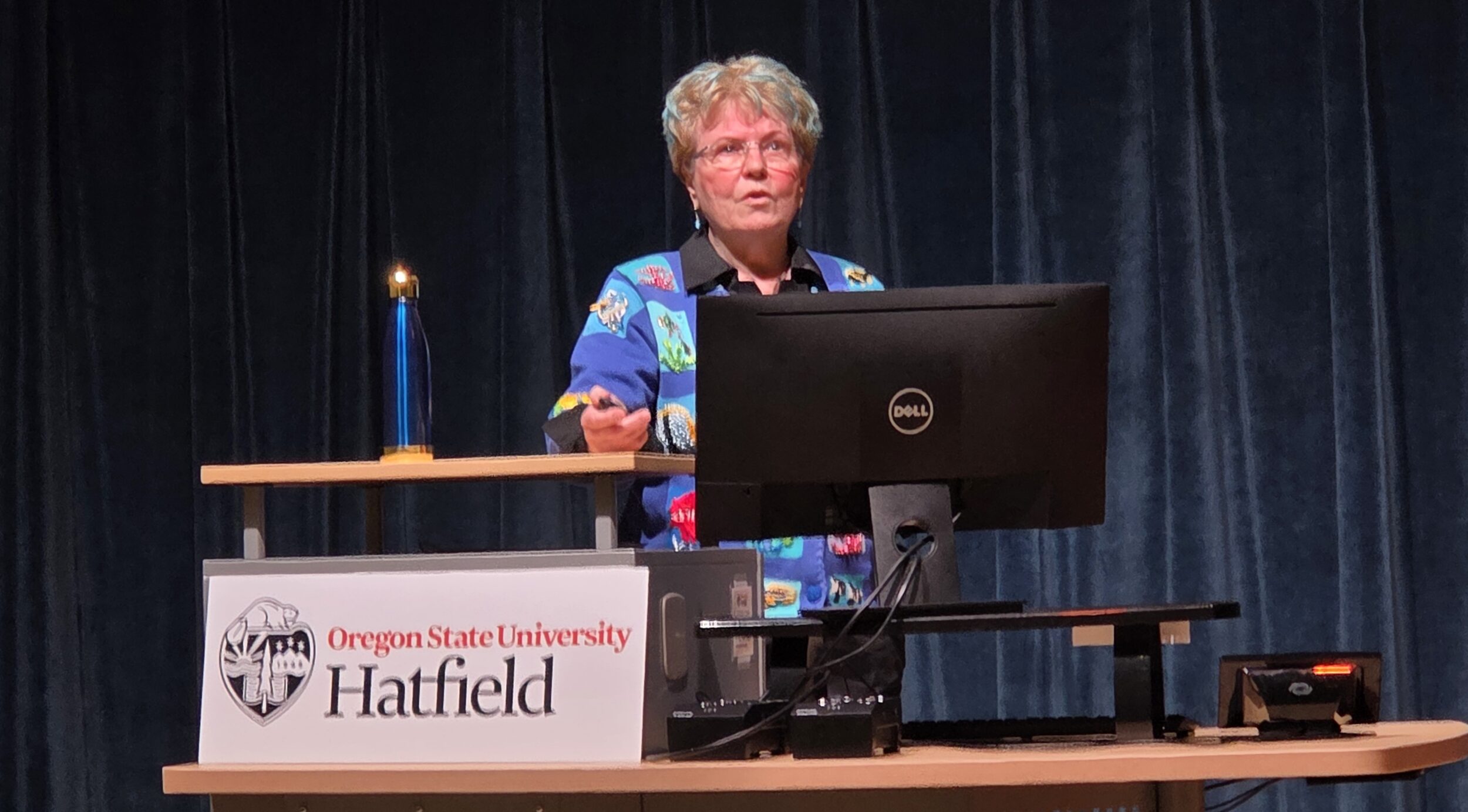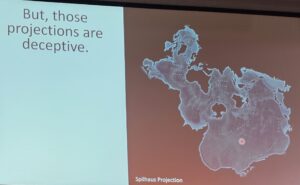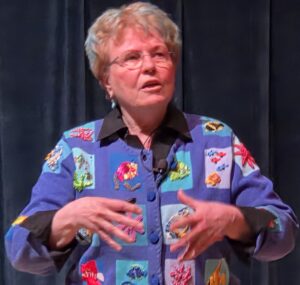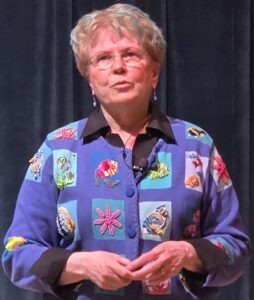
By SHAYLA ESCUDERO/Lincoln Chronicle
NEWPORT – At the start of her lecture, environmental scientist and marine ecologist Jane Lubchenco projected a map onto a screen at Hatfield Marine Science Center. First she showed a map the audience was accustomed to seeing – familiar shapes of land separated by blue oceans. Then, she displayed a second map – a blue mass of ocean with undefined shapes of land called a Spilhaus projection.

The two maps showed the same place – earth from a distance. But rather than seeing the earth as land separated by multiple oceans, the second map showed one ocean that connected all the land.
Lubchenco has served as the director for climate and environment at the White House Office of Science and Technology Policy from 2021 until this year. She is an inaugural member of President Barack Obama’s science team and former Under Secretary of Commerce and NOAA administrator.
But the point Lubchenco was making was simple – narratives are powerful, and narratives have shaped how we see the ocean.
“We’re seeing the emergence of a narrative that puts the ocean at the center of the things that are important to us, the center of our future,” she said. “And that narrative is one that I believe is empowering and encouraging.”
Although Lubchenco’s message was one of hope, of how humans can make tangible differences that offset climate change and environmental degradation, she was aware that her words came amid the Trump administration’s proposed dismantling of scientific research teams and climate change monitoring – changes that would likely set back progress.
A new narrative
One of the world’s most highly cited ecologists, Lubchenco has been a professor at Oregon State University since 1978. In 1993 she was named Distinguished Professor of Zoology. Two years later she and her husband, Bruce A. Menge, were both named Wayne and Gladys Valley Professors of Marine Biology, and were endowed chair positions in the Department of Zoology. The couple are based in Corvallis but also own a home in Depoe Bay.
There have been two dominant narratives about the ocean, said Lubchenco as she stood in Hatfield’s Carmen Ford Phillips Auditorium.

She wore a blue sweater checkered with various sea animals embroidered in the stitching. The tips of her hair too, were dyed blue. The space was nearly full of people, 200 OSU students, faculty and community members attending the Wednesday evening event.
The first narrative is that the ocean is an endless bounty “too big to fail,” Lubchenco said, which resulted in several problems including overfishing and pollution. The second narrative saw the ocean as a problem too large to fix.
“It’s now depleted, especially of big fish and top predators, it’s polluted, it’s disrupted, warm, it’s oxygenated, it’s acidified, and it’s less resilient and less predictable than it used to be,” she said.
Seeing the ocean as a problem too complex to solve creates a lack of engagement and motivation that isn’t helpful.
But there is a third narrative emerging, Lubchenco said, informed by indigenous knowledge and science that sees the ocean as central and too important to ignore. Like the map shows us, there is only one ocean and it connects us all.
The ocean is key for food security, jobs and can even pose a solution to climate change. The ocean is currently the largest carbon reservoir on the planet, sequestering 10 times as much carbon as there is on land.
The ocean could provide as much as one-fifth of the carbon emission reductions needed to get us to the Paris Agreement target of limiting global warming to 1.5 degrees celsius above pre-industrial levels, she said.
“It’s key for equity and justice, and so for all of these reasons, the ocean really needs to be front and center in our thinking about solutions to today’s challenges,” Lubchenco said.
And there are tangible, existing, proven solutions. They just aren’t at the pace of scale that is needed, she said.
One of those changes is how we fish. In the United States, there has been a shift to rights-based fishing that incentivizes conservation by assigning fishing rights to individuals or groups while some fisheries around the world are still using traditionally managed fisheries that rely on quotas that often lead to overfishing.
“These are policy reforms in the U.S. that were led by pioneering fishermen, many of them along our coast here, from Oregon and our neighbors to the north and south,” Lubchenco said.
Studying rights-based fisheries all over the world, scientists showed it was also more sustainable economically and were less likely to collapse, she said. New policies and approaches targeting illegal fishing and advancements in sustainable aquaculture also showed positive solutions to overfishing and food insecurity.
Marine protected areas have been shown to not only preserve the diversity of sea life but protect existing stored carbon, Lubchenco said.
Lubchenco then encouraged audience members there were things they could do too. They could identify and share the solutions that have been working, support organizations that worked on those solutions, and weigh in with elected officials.
“I think the overarching through line here is one of hope that we can recover the bounty of the ocean and use it wisely, with the goal of more fish in the ocean, healthier ocean ecosystems, more seafood on people’s plates, more profitable businesses and healthier communities,” she said.
‘Threatened’
There are reasons to be hopeful – new science, awareness, thinking, partnerships and actual proven solutions.
“They aren’t at the scale or pace that is needed – that is an opportunity,” she said.

But the optimism took a starker turn when audience members asked what the progress meant in the context of the Trump administration’s proposed dismantling of federal science teams, climate monitoring and environmental efforts.
Lubchenco said people have benefited from an existing knowledge base that helps inform citizens, inform management, inform policy, while creating new knowledge and new solutions. Firing scientists and defunding universities, nonprofits and think tanks seriously threatens the knowledge base that helps inform the actions we need to take for the future, she said.
Federal agencies that monitor ocean temperatures, heat waves, atmospheric conditions and weather systems are being dismantled.
“It’s really a serious threat to all of us, and I’m just appalled by what’s happening, because it is not easy to recover that knowledge base,” Lubchenco said.
The hope, urgency and agency that Lubchenco had talked about in her presentation is contingent on having functional systems and dialogue across a partisan divide, she said.
“My hope is that we keep it from being as horrendous as it looks like it will be, but that we do everything possible to get to a better place, because, in fact, our futures depend on it.”
- Shayla Escudero covers Lincoln County government, education, Newport, housing and social services for Lincoln Chronicle and can be reached at Shayla@LincolnChronicle.org




















